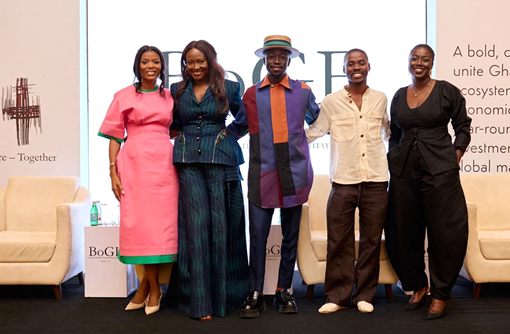Copyright thebftonline

By Sandra Agyeiwaa OTOO The Business of Ghanaian Fashion (BoGF) Summit 2025 brought together key players from Ghana’s fashion, policy and business sectors to chart a sustainable path for the country’s creative economy. The event, held in Accra, was organised by HSA PR and spearheaded by Fashion Nexus Ghana under the theme ‘Building a sustainable future for Ghana’s fashion industry’. It received support from the United Nations Educational Scientific and Cultural Organisation (UNESCO), African Continental Free Trade Area (AfCFTA) Secretariat, Ministry of Trade and Industry, Ghana Revenue Authority (GRA) and renowned fashion-house Christie Brown. Founder of Fashion Nexus Ghana and Project Lead for BoGF, Hillary Andoh, described the summit as the start of a national movement to build a united and competitive fashion ecosystem. “Today marks the beginning of a movement to strengthen and sustain the Business of Ghanaian Fashion (BoGF). Our vision is to bring together fashion designers, manufacturers, textile producers, educators, policymakers and investors to build a connected private industry that reflects Ghanaian creativity, talent and entrepreneurial spirit and help develop, formalise and scale it to its full potential,” she asserted. The summit featured keynote sessions, panel discussions and policy roundtables focused on value chain development, education, sustainability and digital trade. Participants discussed strategies to strengthen Ghana’s position as a fashion powerhouse within Africa’s creative economy. The Business of Ghanaian Fashion (BoGF) Initiative seeks to bridge key gaps within Ghana’s fashion industry by fostering innovation, collaboration and investment. With the global fashion market valued at US$1.84trillion, Ghana stands positioned to compete effectively on the international stage. The initiative’s impact goals focus on creating employment opportunities, attracting investment into the creative economy, enhancing the competitiveness of Ghanaian brands globally and promoting sustainability across the value chain. Through these efforts, BoGF aims to transform fashion into a driver of inclusive economic growth and national development. Edmond Moukala, Head of Office and UNESCO Representative to Ghana, described the 24-hour economy as a game-changer for Ghana’s fashion industry, envisioning non-stop production, cross-border collaboration and digital trade that meets global demand at any hour. “The 24-hour economy concept presents a transformative paradigm for Ghana’s fashion industry. Imagine a sector where production lines hum around the clock, where designers collaborate across time zones and where retail and e-commerce platforms operate seamlessly in catering to a global demand that never sleeps,” he stated. Aisha Ayensu, Founder and Creative Director of Christie Brown, urged stakeholders to move beyond merely admiring Ghana’s creative potential and instead harness it collectively as an industry where creativity and commerce work hand in hand to drive sustainable growth. “We need to stop romanticising potential and start embracing it. Passion should not be treated as ours alone but as an industry, one wherein creativity and commerce speak the same language,” she revealed. Deputy Chief Industrial Promotion Officer-Ministry of Trade, Agribusiness and Industry, Kwasi Ofori-Antwi, reaffirmed government’s commitment to positioning Ghana’s fashion and textile industry as a major driver of economic growth and export diversification – supported by policies that enhance competitiveness, skills, financing and global standards. “On behalf of the Minister and Ministry of Trade, Agribusiness and Industry, I would like to reaffirm government’s commitment to advancing Ghana’s fashion and textile industry as a key pillar of economic growth and export diversification. The ministry is implementing a policy framework that strengthens competitiveness, enhances skills, expands access to finance and promotes global standards across the value chain,” he affirmed. Elsie Appau-Klu, Technical Advisor to the Commissioner-General of the Ghana Revenue Authority (GRA), expressed enthusiasm about the Authority’s partnership with Fashion Nexus Ghana – noting that GRA is committed to engaging creative industry players, simplifying tax systems and creating an enabling environment for their meaningful contribution to national development. “On behalf of the GRA Commissioner-General, I am excited that we are partnering with the Fashion Nexus Ghana initiative. This is not one of the very traditional things we do, but the current administration of GRA sees institutions like yours as partners that we must engage, understand and work with – simplifying our tax systems so we can enable you and create a space for you to contribute meaningfully to the development of our country,” he noted. Daphine Lekipaika, Expert in Trade Services at the African Continental Free Trade Area (AfCFTA) Secretariat, highlighted that the AfCFTA framework offers significant opportunities for Africa’s fashion value chain by eliminating trade barriers, enhancing regional production and sourcing and creating a unified continental market for ‘Made in Africa’ fashion brands.



